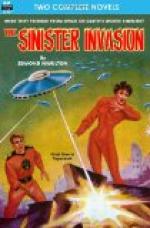Silence. Around Lockley there were the usual sounds of the wilderness. Insects made chirping noises. Birds called. There were those small whispering and rustling and high-pitched sounds which in the wild constitute stillness.
A scraping sound from the speaker. Vale’s voice, frantic.
“That ... exploring party. It’s here! They must have picked up our beams. They’re looking for me. They’ve sighted me! They’re coming....”
There was a crashing sound as if Vale had dropped the communicator. There were pantings, and the sound of blows, and gasped profanity—horror-filled profanity—in Vale’s voice. Then something roared.
Lockley listened, his hands clenched in fury at his own helplessness. He thought he heard movements. Once he was sure he heard a sound like the unshod hoof of an animal on bare stone. Then, quite distinctly, he heard squeakings. He knew that someone or something had picked up Vale’s communicator. More squeakings, somehow querulous. Then something pounded the communicator on the ground. There was a crash. Then silence.
Almost calmly Lockley swung his instrument around and lined it up for Sattell’s post. He called in a steady voice until Sattell answered. He reported with meticulous care just what Vale had said, and what he’d heard after Vale stopped speaking—the roaring, the sound of blows and gasps, then the squeakings and the destruction of the instrument intended for the measurement of base lines for an accurate map of the Park.
Sattell grew agitated. At Lockley’s insistence, he wrote down every word. Then he said nervously that orders had come from Survey. The Army wanted everybody out of the Boulder Lake area. Vale was to have been ordered out. The workmen were ordered out. Lockley was to get out of the area as soon as possible.
When Sattell signed off, Lockley switched off the communicator. He put it where it would be relatively safe from the weather. He abandoned his camping equipment. A mile downhill and four miles west there was a highway leading to Boulder Lake. When the Park was opened to the public it would be well used, but the last traffic he’d seen was the big trailer-truck of the Wild Life Control service. That huge vehicle had gone up to Boulder Lake the day before.
He made his way to the highway, following a footpath to the spot where he’d left his own car parked. He got into it and started the motor. He moved with a certain dogged deliberation. He knew, of course, that what he was going to do was useless. It was hopeless. It was possibly suicidal. But he went ahead.
He headed northward, pushing the little car to its top speed. This was not following his instructions. He wasn’t leaving the Park area. He was heading for Boulder Lake. Jill was there and he would feel ashamed for all time if he acted like a sensible man and got to safety as he was ordered.




